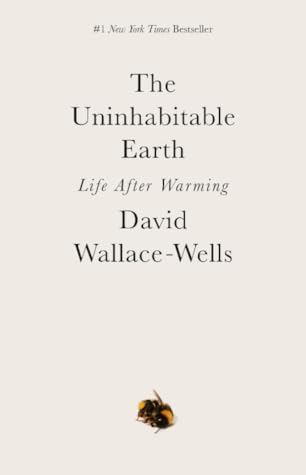More on this book
Community
Kindle Notes & Highlights
Read between
July 13 - August 4, 2023
Climate change is fast, much faster than it seems we have the capacity to recognize and acknowledge; but it is also long, almost longer than we can truly imagine.
Climate change isn’t something happening here or there but everywhere, and all at once.
Rhetoric often fails us on climate because the only factually appropriate language is of a kind we’ve been trained, by a buoyant culture of sunny-side-up optimism, to dismiss, categorically, as hyperbole.
globally, according to the IMF, we are subsidizing the fossil fuel business more than $5 trillion each year.
Americans waste a quarter of their food, which means that the carbon footprint of the average meal is a third larger than it has to be.
Global warming, in other words, is more than just one input in an equation to determine carrying capacity; it is the set of conditions under which all of our experiments to improve that capacity will be conducted.
A state of half-ignorance and half-indifference is a much more pervasive climate sickness than true denial or true fatalism.
“Someday, perhaps not long from now, the inhabitants of a hotter, more dangerous and biologically diminished planet than the one on which I lived may wonder what you and I were thinking, or whether we thought at all.”
“We all lived for money, and that is what we died for.”
All climate change is governed by uncertainty, mostly the uncertainty of human action—what action will be taken, and when, to avert or forestall the dramatic transformation of life on the planet that will unfold in the absence of dramatic intervention.
Even atheists and agnostics might find themselves whispering the phrase “act of God” in the aftermath of a hurricane, or wildfire, or tornado, if only to express how inexplicable it felt to endure such suffering with no author behind it, no one to blame for it.
We frequently choose to obsess over personal consumption, in part because it is within our control and in part as a very contemporary form of virtue signaling. But ultimately those choices are, in almost all cases, trivial contributors, ones that blind us to the more important forces. When it comes to freshwater, the bigger picture is this: personal consumption amounts to such a thin sliver that only in the most extreme droughts can it even make a difference.
One study tracing human impact on marine life found only 13 percent of the ocean undamaged, and parts of the Arctic have been so transformed by warming that scientists are beginning to wonder how long they can keep calling those waters “arctic.”
Already, more than 10,000 people die from air pollution daily. That is considerably more each day—each day—than the total number of people who have ever been affected by the meltdowns of nuclear reactors.
Globally, one out of six deaths is caused by air pollution.
we now know that it will be much, much more expensive to not act on climate than to take even the most aggressive action today.
Over the last decade, researchers have even managed to quantify some of the nonobvious relationships between temperature and violence: for every half degree of warming, they say, societies will see between a 10 and 20 percent increase in the likelihood of armed conflict.
This is climate’s kaleidoscope: we can be mesmerized by the threat directly in front of us without ever perceiving it clearly.
Complicity does not make for good drama. Modern morality plays need antagonists, and the desire gets stronger when apportioning blame becomes a political necessity, which it surely will.
One message of climate change is: you do not live outside the scene but within it, subject to all the same horrors you can see afflicting the lives of animals.
Twenty-two percent of the earth’s landmass was altered by humans just between 1992 and 2015. Ninety-six percent of the world’s mammals, by weight, are now humans and their livestock; just four percent are wild.
Scientists spent decades presenting the unambiguous data, demonstrating to anyone who would listen just what kind of crisis will come for the planet if nothing is done, and then watched, year after year, as nothing was done.
We do not yet know, of course, just how much suffering global warming will inflict, but the scale of devastation could make that debt enormous, by any measure—larger, conceivably, than any historical debt owed one country or one people by another, almost none of which are ever properly repaid.
If we could wish a solution into place by imagination, we’d have solved the problem already.
“Staring into the screen so we don’t have to see the planet die.”
There is no good thing in the world that will be made more abundant, or spread more widely, by global warming. The list of the bad things that will proliferate is innumerable.
“Man-made weather is never made in the present,”
“Once you know about overpopulation, overshoot, depletion, climate change, and the dynamics of societal collapse, you can’t unknow it, and your every subsequent thought is tinted.”
If humanity is the capacity to act meaningfully within our surroundings, then we are not really, or not yet, human.
If we allow global warming to proceed, and to punish us with all the ferocity we have fed it, it will be because we have chosen that punishment—collectively walking down a path of suicide. If we avert it, it will be because we have chosen to walk a different path, and endure.
The search for alien life has always been powered by the desire for human importance in a vast, forgetful cosmos: we want to be seen so that we know we exist.


